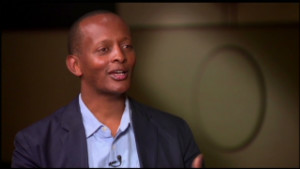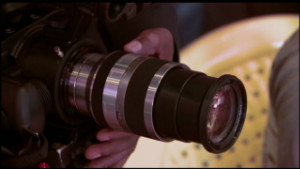July 3, 2012 -- Updated 1327 GMT (2127 HKT)
The face of Rwandan cinema
STORY HIGHLIGHTS
- Eric Kabera is a cinema pioneer who started the first film school in Rwanda
- He's the producer of '100 Days,' Rwanda's first internationally-acclaimed movie
- Kabera is also the founder of the annual Rwandan film festival known as "Hillywood"
- The festival started in 2005 and today attracts filmmakers from across the world
African Voices
is a weekly show that highlights Africa's most engaging personalities,
exploring the lives and passions of people who rarely open themselves up
to the camera.
(CNN) -- Over the last few years, several films have recaptured the devastating legacy of the 1994 Rwanda genocide, recreating the unimaginable pain and loss that defined the darkest period in the history of the small African country.
But before iconic movies
such as the Oscar-nominated "Hotel Rwanda," the epic "Sometimes in
April" and the compelling "Shake hands with the devil," came "100 Days" -- Rwanda's first ever internationally-acclaimed movie produced by Rwandan film pioneer Eric Kabera.
The 2001 feature film
explains in dramatic form what happened during the genocide when an
estimated 800,000 Tutsis and politically-moderate Hutus were murdered in
just 100 days.
The film is a brave tale
of love and betrayal, reflecting the reality that both the victims and
the perpetrators had to rebuild a country torn apart in a horrific
massacre.

Making 'Africa Untied'
"For me the essence was
just not making a movie," says Kabera, who lost 32 members of his family
during the genocide. "I wasn't after fame, I wasn't after money. I was
just after the theme and the drive to tell the Rwandan stories from
within so that the world can care because film has got a powerful
message to send across."

Rwanda's first film school
The idea for "100 Days"
was born in 1997 when Kabera joined forces with British filmmaker Nick
Hughes, who was among the very few cameramen witnessing the genocide.
"Together we said 'let's
produce the first feature film' and this became the genesis or the
essence of the current Rwanda film industry," says Kabera. "Genocide is
such a bold and quite a taboo subject -- it's been written about, it's
been talked about, but no one had dared go and recreate it on screen.
"[About] a decade
later...10 to 15 films were made about the genocide and that sort of
became the defining, iconic element of the Rwandan film industry."
With "100 Days," Kabera,
who grew up in exile in neighboring Congo, wanted to ensure that the
world still cared about what happened to his country. He says it was a
"very courageous" and "difficult" film to make, having to revisit the
actual sites where some of the atrocities took place.
"You are seating on the
set and you could actually feel the smell of the dead coming your way --
a cast member choking over a skull," he says. "Or the church where the
filming took place - was where more than 1,000 people were killed. So it
was courageous, a disturbing moment but a paramount moment for people
and Rwanda's history."
For his next major
project Kabera went solo, producing and directing "Keepers of Memories"
in 2004, a documentary on the Rwandan genocide where convicted killers
speak openly on how they took innocent lives, while survivors take
viewers through their quest to keep the memory of the victims alive for
future generations.
But Kabera says there are many more stories told to be in Rwanda today, away from conflict and suffering.
Riding on the euphoria
surrounding the football world cup in South Africa in 2010 -- the first
time the world's arguably greatest sporting event came to the continent
-- Kabera decided to create a film that would mirror modern Africa.
You are seating on the set and you could actually feel the smell of the dead coming your way.
Eric Kabera
Eric Kabera
"Africa United"
describes the incredible journey of three Rwandan boys to achieve their
greatest dream -- attending the opening ceremony of the world cup.
"'Africa United'
actually became the story that put Africa on the map in 2010 in defining
new ways of telling a story," says Kabera. "A happy, a hopeful story
without necessarily forgetting the ills that have been on the continent
...[but] defining literally the hopes and one of the greatest moments
that Africa lived in this decade."
After years of directing
and producing firms, Kabera decided to share his experience with a new
generation of movie makers. He founded Kwetu Film Institute, Rwanda's
first film school, where budding directors are trained in all aspects of
cinematography, lighting, sound and post-production.
The students upload their films online, while some are chosen for another of Kabera's initiatives: "Hillywood."
A play on America's Hollywood or Nigeria's film industry Nollywood, Hillywood is an annual film festival in Rwanda where films are shown on inflated screens in villages across the country.
"Rwanda is a land of a
thousand hills and a couple friends of mine said 'let's just call this
Hillywood because it is film in the hills of Rwanda,'" says Kabera.
"We said we better take
movies to the countryside where people can actually see themselves on
screen and have the ability to express themselves and see their past and
future perspectives -- so within that mandate it became very clear that
film has a very powerful message to send across."
We can define who we are but we can never, ever, ignore or brush off the past.
Eric Kabera
Eric Kabera
Hillywood has been
running strong since 2005 and now attracts filmmakers from across the
world who compete for a coveted statue of a silverback gorilla: Rwanda's very own Oscar.
Kabera says the genocide
will always define Rwanda but people need to move beyond the 1994
events while acknowledging their history.
"We can define who we are but we can never, ever, ignore or brush off the past."
Kabera says he's proud
to be part of the efforts to help rebuild Rwanda. "Currently, it is the
sense of admiration that Rwanda has today," he says.
"It gives me the sense
of belonging, the pride to be part of that resonance, that new force of
redefining an identity, making sure that what happened never gets
repeated."

Nice Article! Thanks for sharing with us.
ReplyDeleteScott Robarge